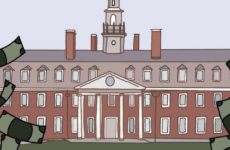It is never acceptable when elements of one’s culture are caricatured by another. Take, for example, the holiday just past. A Halloween costume that depicts, say, a Native American should never be countenanced. Not only is it unlikely to accurately represent the traditional dress of that culture, but — and more to the point — it is never appropriate to use another culture as a plaything. It’s offensive and dehumanizing. Native Americans have historically been brutally mistreated and abused. A surefire way to perpetuate the notion that Native American culture can be exploited is to borrow, no doubt reductively, elements of their culture to generate a costume. This is to say nothing of team names such as the Washington Redskins, the Atlanta Braves, and the Florida State Seminoles, or the tendency of President Donald Trump P’00 to mockingly call Senator Elizabeth Warren “Pocahontas.” (Sen. Warren, a Democrat from Massachusetts, has claimed Cherokee and Delaware Indian heritage.)
In recent years, the Choate community has devoted a commendable amount of effort toward teaching students and faculty how to avoid the harmful effects of cultural stereotyping and other forms of derision. Nevertheless, some of us on campus continue to fail to recognize the grave insult of these actions.
As my name implies, I am of Italian descent. My grandparents immigrated to the United States from Southern Italy in the 1950s; ever since, my relatives have dedicated themselves to hard work in order to become successful individuals. I am extremely proud of my family’s history and culture, and a huge part of my identity is my Italian heritage. However, I find that many times my culture is disrespected and humiliated.
For example, many find humor in the way Italians sometimes speak English, adding a vowel to the end of words and gesticulating with their hands. I’ve seen students and adults alike imitate this stereotype, eliciting laughter in onlookers. However, when I see my culture caricatured in this way, I am reminded of family members being turned away from establishments like banks and restaurants because somebody refused to try to understand them. My relatives have expressed the embarrassment they feel when they are unable to be understood or when somebody simply rejects them because of their inability to speak English well.
Food is an essential component of my culture; at family gatherings throughout the year, my relatives cook many and varied dishes. However, one often associates Italians with what are thought to be staple dishes, such as pizza. I’ve been told: “I ate pizza last night, Vincenzo. I’m almost as Italian as you are.” More than 50 years after immigrating to the United States, my family has assimilated into American culture to an extent where our diet extends far beyond pizza.
Moreover, in the part of Italy from which my family emigrated, pizza is not an essential component of the diet. My grandmother’s family is from a town where meat has long taken priority over both pizza and pasta. Simply associating what is thought to be typical food with an entire culture perpetuates the issue of generalizing cultures and assumes that everybody of a particular identity practices the same traditions. In addition, it implies that those who attempt to assimilate to new cultures are unable to do so.
Unfortunately, we often only avoid racial and cultural stereotyping when the consequences are starkly apparent. We are aware, for instance, of the horrific mistreatment of Native Americans throughout American history, and because of this, we duly avoid appropriating Native American culture, on Halloween or at any other time of the year. However, stereotyping a culture is still wrong even if its consequences aren’t apparent. Regarding Italian culture, many just aren’t aware of the hardships that Italian immigrants have endured. It is imperative that we are mindful about our actions in this regard. We mustn’t ever assume that deriding a particular culture is nothing more than fun and games.
what we like best, every pleasure is to be welcomed and every pain





